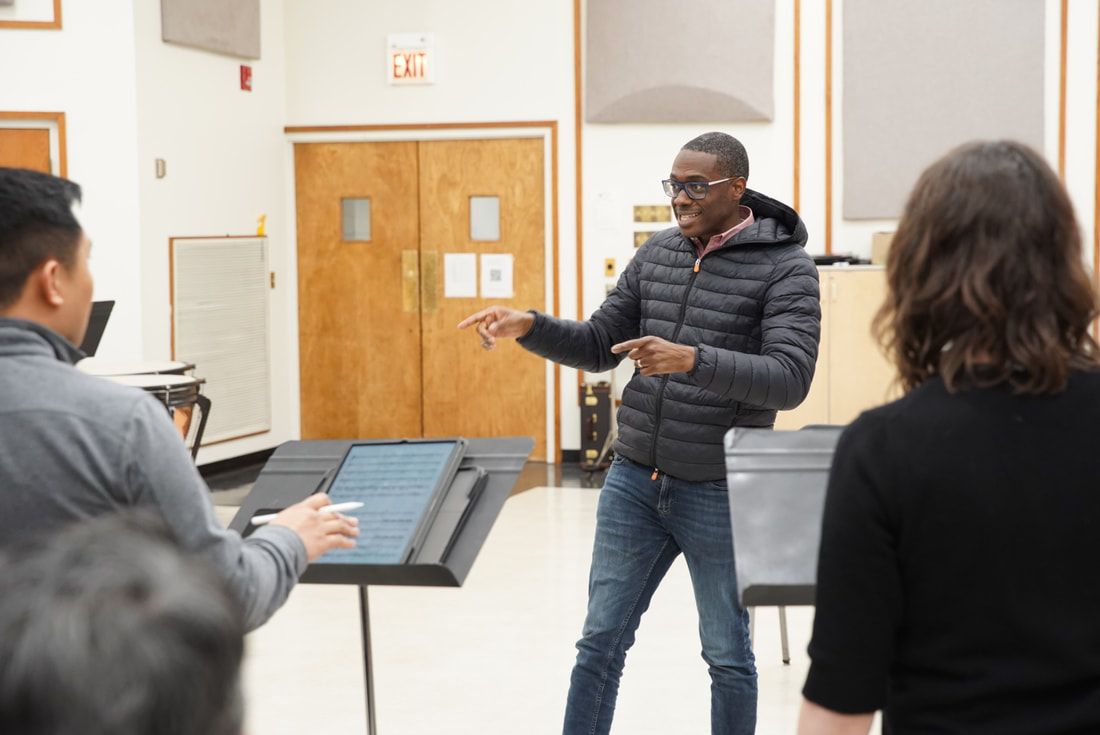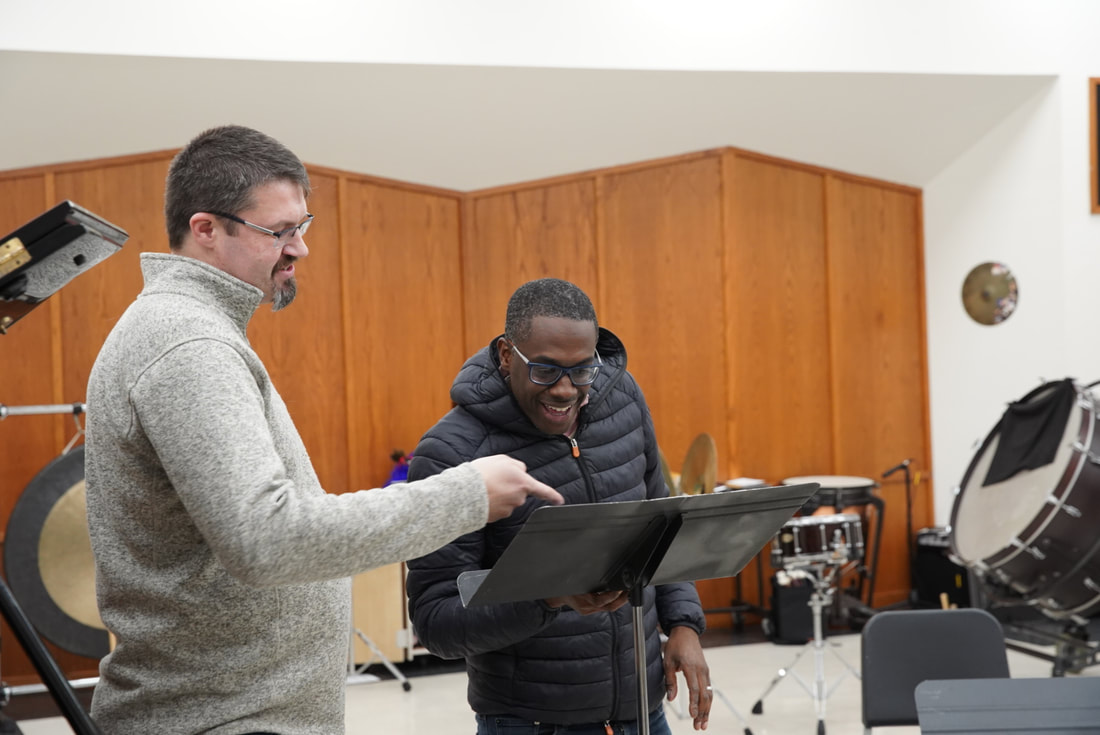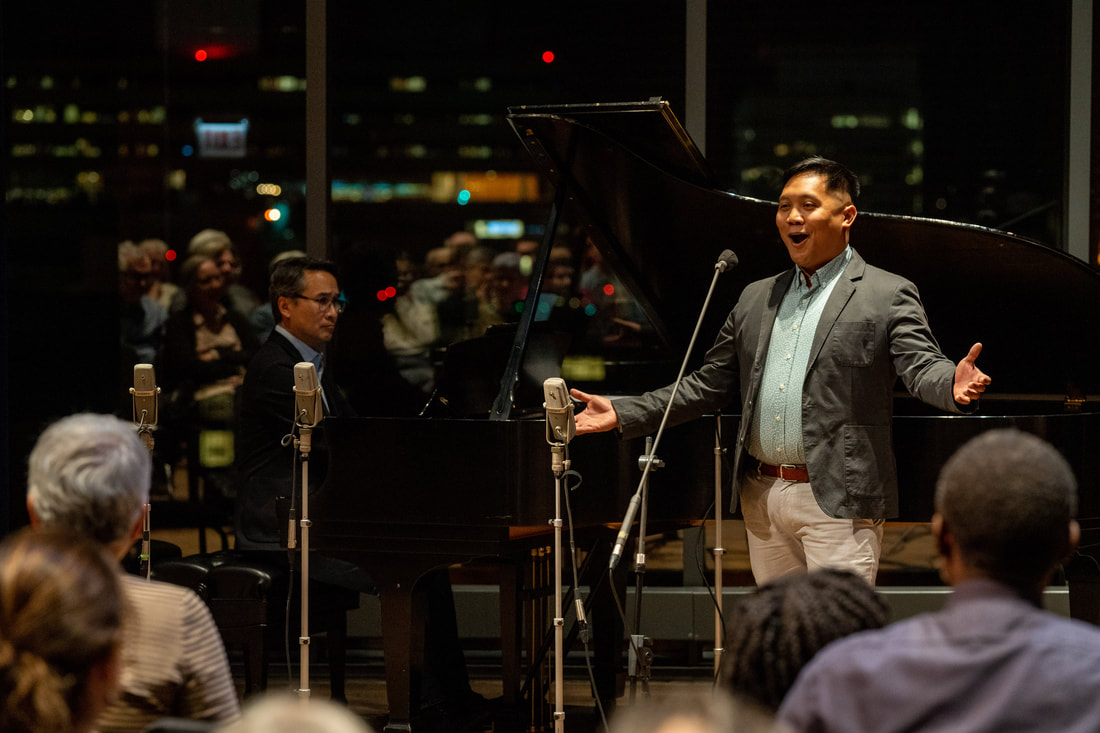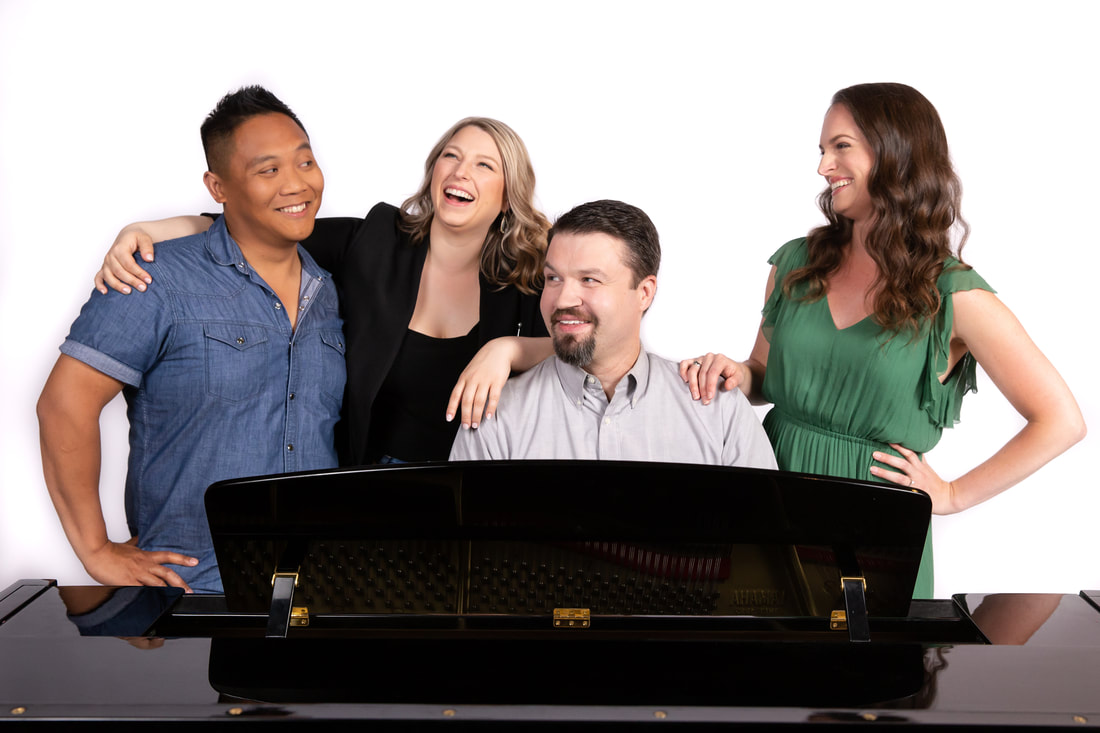|
By Ace Gangoso It is a unique pleasure to get to work directly with a composer while preparing to perform one of their pieces. Few are privileged enough to do so, and as a classical singer, this is often impossible because many of the composers in the standard repertoire are long gone from this world. One great aspect of being a part of Fourth Coast Ensemble is the collaborative relationship we have built with some of today's composers. This post will highlight our recent work with Grammy-nominated composer Shawn Okpebholo who is, like his music, very much alive! The quartet was honored to have him be a part of our rehearsal process as we prepared several of his works for our "Fine Folk" concerts this past April. He had a wonderful and energetic spirit about him, and although we were workshopping music he had written and published several years ago, it was as if we were creating something brand new. Beyond the fact that we were adapting some of his pieces to be sung by different voice types (or different combinations of voices) than originally scored, it seemed that Shawn doesn't consider any of his work to be written in stone. It is never "done." He was listening, engaging, dreaming, and experimenting until it was right; right for this group of performers and their musical, technical, and artistic sensibilities. For this program, I sang Shawn's thrilling setting of the spiritual "Great Day" with pianist Kuang-Hao Huang. It's a text and melody I already knew well, but never have I experienced it with the harmonic and textural landscape that he has created here, most noticeable in the piano part. As this was written originally to be sung by baritone Will Liverman, I obviously requested a version that is transposed to a higher key. Once we got together in the rehearsal room, Shawn agreed that the new key worked, but requested an additional change: at a climactic moment in the piece, after two ascending key changes in quick succession, he wanted the vocal line to crest even higher. What tenor would say no to more high notes? As a bonus, I got to interview Shawn at our Hyde Park concert. (He's a great and animated talker and made easy work for this introvert.) He allowed us some insights to a few things: how his cultural roots and his classical music training inform his artistry, the place of African-American spirituals in the classical canon, and why he calls his settings of these spirituals "reimaginations" rather than "arrangements." In case you missed our "Fine Folk" performances, you can still catch our online rebroadcast of the full concert at the Logan Center. Please enjoy this opportunity to hear him tell a bit of his story in his own words. There you'll also be able to hear three more of Shawn's pieces, as well as our collaborations with the Jonas Friddle Band (with Anna Jacobson and Andrew Wilkins), Peggy Browning, Jennie Oh Brown, and Kuang-Hao Huang.
0 Comments
David: For most singers, the art that we create is a communal experience. The synergy of a choir of voices generates the magic of the music that we love. While the music itself has been conspicuously absent this year, singers have also missed out on countless hours of making music with colleagues who are also dear friends. The pandemic has reminded us not to take friendship for granted, and I have acquired very specific memories of seeing friends for the first time after quarantine. This week on The Art Song Fix we are showcasing "The Pleasures of Friendship" from Wayland Rogers’ I-Thou, a light-hearted celebration of spending time with companions. It has indeed been a pleasure to continue to make music with my Fourth Coast friends! Sarah: This song is one of my favorite movements from I-Thou, a song cycle for vocal quartet commissioned by Fourth Coast and premiered in May 2018. It’s a lively a cappella fugue for the four voices, truly capturing the joy and “Pleasures of Friendship” in the playful way the theme bounces between the voices. After one full statement of the jaunty theme by the soprano, the tenor next presents the melody with interjections bouncing off by soprano and mezzo in duet, followed by a more complete trio version by the three voices. Finally, the bass enters in a new key, infusing new energy into the quartet of friends as they react to one another’s statements. The four voices expand into a flurry of activity before all coming together to end in unified rhythm and a unison note - a beautiful encapsulation of friends joining! Bridget: English poet Stevie Smith's work commonly portrays scenes of innocence and nostalgia, often nursery-rhyme-like on the surface. "The Pleasures of Friendship" is the perfect example of just such a work. However, critics agree that despite the whimsical appearance of her work, Smith was a significant talent whose distinct style grew more consistent and refined throughout her life. The deceptive simplicity of her poetry was described by the Times Literary Supplement as her "most distinctive achievement." Smith's scenes of simple joy remind us that life is short, and every walk through the grass with friends should be savored. Ace: We have done a few of these virtual video performances now, and at this point, the whole process of recording and editing feels quite normal to us. We have learned more about audio and video than most classical singers probably dreamed would be so necessary and useful. Still, while standing in a closet alone, singing to a track and click of a metronome and taking video selfies while performing to an imaginary audience no longer feels as awkward and stilted as it did at first, truly nothing can replace the real deal. The quartet is in “hybrid mode” now with a few livestream concerts under our belt, music videos like this, and a return to in-person rehearsals just this past week. It was refreshing to be able to, collectively in real-time, discuss interpretation, how to color and shape phrases, balance our voices, place our cutoffs, etc.—you know, normal music things! The intimacy of making eye contact and breathing together is pulling us out from within the literal and figurative walls that have contained us for the past year. We sense the returning thrill and pressure of having to create something beautiful together in the moment for a live audience, and we cannot wait to share more about the exciting plans we have for the summer and for next season. Stick with us, and stay tuned! AuthorFourth Coast Ensemble is a classical vocal quartet specializing in the unique style and repertoire of vocal chamber music. Celebrated for its "horizon-expanding programming, (Chicago Classical Review), Fourth Coast Ensemble embraces a repertoire that spans the history of the genre, from Schubert and Brahms to composers of the present day. The ensemble has earned a reputation of excellence "built on the quality of its small roster of artists" (Vocal Arts Chicago) - soprano Sarah van der Ploeg, mezzo-soprano Bridget Skaggs, tenor Ace Gangoso, and bass-baritone David Govertsen. |
SUBSCRIBEAboutHello, and welcome to the blog! We are Fourth Coast Ensemble, Chicago's classical vocal quartet. Join a different member of our ensemble for insights into our favorite art songs, links to archival and new recordings, and reflections on why we value and continue to come back to this musical medium. We proudly present, your #artsongfix! Archives
June 2023
Categories
All
|





 RSS Feed
RSS Feed
